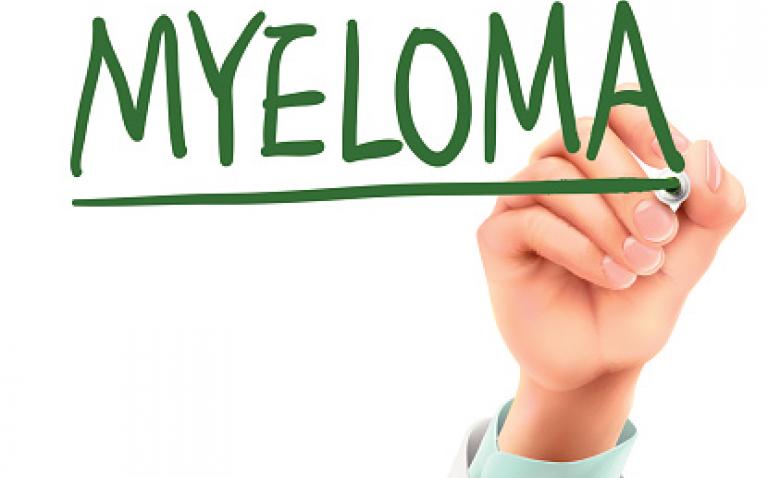Amgen announced that Kyprolis® (carfilzomib) in combination with lenalidomide and dexamethasone is now available in the UK for the treatment of adult patients with multiple myeloma who have received at least one prior therapy. Carfilzomib is the first licensed irreversible proteasome inhibitor for use in combination treatment of patients with relapsed multiple myeloma.1
The European Commission licensed carfilzomib in combination with lenalidomide and dexamethasone based on the ASPIRE study in November 2015. Carfilzomib has shown significant improvement in progression-free survival (PFS) compared to lenalidomide and dexamethasone, reinforcing the belief that it may provide a new treatment option for patients with relapsed multiple myeloma.
“Multiple myeloma is a rare and aggressive blood cancer that often becomes resistant to treatment, which is why there is a need for new therapeutic options that extend the time patients live without their disease progressing,” said Tony Patrikios, Executive Medical Director at Amgen UK.
He added, “Although advances in treatment have been made over recent decades, multiple myeloma remains an incurable disease. We deeply appreciate the commitment of patients in over 20 UK clinical centres who have participated in clinical trials that has allowed us to bring carfilzomib to patients in the UK. Carfilzomib provides an important new treatment option for relapsed multiple myeloma, helping to address a real unmet need for this rare blood cancer. We will continue to work with all our partners and stakeholders to ensure this new medicine is made available to patients in the UK.”
Myeloma UK Chief Executive Eric Low said, “Myeloma is a relapsing and remitting cancer and so it’s extremely important that we continue to see access to new effective treatments. To that end, we very much welcome the European approval of carfilzomib and we will work closely with Amgen and the various healthcare technology assessment bodies in the UK to ensure that patients get access as quickly as possible.”
Amgen expects to make a submission to the National Institute for Health and Care Excellence later in 2016 based on the ASPIRE study, already reflected in the current labelling for carfilzomib, and also the ENDEAVOR study.
In the pivotal Phase III ASPIRE (CArfilzomib, Lenalidomide, and DexamethSone versus Lenalidomide and Dexamethasone for the treatment of PatIents with Relapsed Multiple MyEloma) study, patients with relapsed/refractory multiple myeloma (RRMM) treated with carfilzomib in combination with lenalidomide and dexamethasone achieved more than two years without disease progression. Of these approximately one out of three patients achieved a complete response or better.2 These results indicate that carfilzomib is a step forward in the treatment of patients with multiple myeloma.
Complete response in the study was defined as treatment outcomes where there are less than 5% plasma cells in the bone marrow and no evidence of myeloma proteins in the serum or urine as measured by standard laboratory techniques.2
In the ASPIRE study, carfilzomib in combination with lenalidomide and dexamethasone (regimen referred to as KRd) increased median time to progressive disease or death by 8.7 months compared to patients treated with lenalidomide and dexamethasone (regimen referred to as Rd).2 The median PFS was 26.3 months in the KRd arm compared to 17.6 months in the Rd arm (HR: 0.69; 95% CI: 0.57 to 0.83; P=0.0001).2 In a pre-planned post-hoc analysis of PFS, patients who received KRd early in their treatment pathway (at 1st relapse) showed a more pronounced benefit with 12 months additional PFS (29.6 months compared with 17.6 months for Rd alone, HR 0.69 (0.52-0.94).3
Discontinuation of treatment due to adverse events occurred in 15% of patients in the KRd arm versus 18% of patients in the Rd arm.2 In clinical trials with carfilzomib, the most common adverse reactions (occurring in more than 20% of patients) were anaemia, fatigue, diarrhoea, thrombocytopenia, nausea, pyrexia, dyspnoea, respiratory tract infection, cough and peripheral oedema.1 Cases of hepatic failure (less than 1%) were also reported by patients in clinical studies with carfilzomib.1
The Phase III ENDEAVOR (RandomizEd, OpeN Label, Phase III Study of Carfilzomib Plus DExamethAsone Vs Bortezomib Plus DexamethasOne in Patients With Relapsed Multiple Myeloma) trial compared PFS in patients with multiple myeloma treated with carfilzomib plus dexamethasone versus those receiving Velcade® (bortezomib) plus dexamethasone.4 The data from this study are currently being reviewed by the European Medicines Agency.
Although multiple myeloma is not as widely known as other types of cancer, it is the second most common haematological cancer in the UK,5 characterised by unregulated plasma cell proliferation. With approximately 4900 new cases diagnosed each year,6 the UK incidence rate is ninth highest in Europe for males and eighth highest for females.6 It is estimated that around 15,000–20,000 people are living with myeloma in the UK.7 Multiple myeloma is an aggressive cancer with less than half of patients surviving for five years,8 leading to more than 2700 deaths in the UK in 2012.9
References:
- Kyprolis® (carfilzomib). Summary of Product Characteristics. November 19, 2015. Available at https://www.medicines.org.uk/emc/medicine/31222 (accessed 4 Feb 2016).
- Stewart KA et al. Carfilzomib, Lenalidomide, and Dexamethasone for Relapsed Multiple Myeloma. N Engl J Med 2015; 372:142–52.
- Dimopoulos, MA et al. Effect of Carfilzomib, Lenalidomide, and Dexamethasone vs Lenalidomide and Dexamethasone in Patients With Relapsed Multiple Myeloma by Line of Therapy: Secondary Analysis From an Interim Analysis of the Phase 3 Study ASPIRE (NCT 01080391). Poster 342 presented American Society of Clinical Oncology, May 29 – June 2 2015; Chicago, Illinois.
- Clinicaltrials.gov: Phase 3 Study With Carfilzomib and Dexamethasone Versus Bortezomib and Dexamethasone for Relapsed Multiple Myeloma Patients (ENDEAVOR). Available at https://clinicaltrials.gov/ct2/show/NCT01568866 (accessed 9 Feb 2016).
- Cancer Research UK. Cancer incidence for common cancers. Available at http://www.cancerresearchuk.org/health-professional/cancer-statistics/incidence/common-cancers-compared#heading-Zero (accessed 11 Jan 2016).
- Cancer Research UK. Myeloma statistics. Available at http://www.cancerresearchuk.org/health-professional/cancer-statistics/statistics-by-cancer-type/myeloma#heading-Zero (accessed 11 Jan 2016).
- Myeloma UK – Myeloma: Essential Guide. Available at: http://www.myeloma.org.uk/wp-content/uploads/2013/09/Myeloma-UK-Living-well-with-myeloma-Essential-Guide-Nov-2015.pdf (accessed 12 Jan 2016).
- Seer. Available at http://seer.cancer.gov/statfacts/html/mulmy.html (accessed 11 Jan 2016).
- Cancer Research UK. Myeloma mortality statistics. Available at http://www.cancerresearchuk.org/health-professional/cancer-statistics/statistics-by-cancer-type/myeloma/mortality#heading-Zero (accessed 11 Jan 2016).










